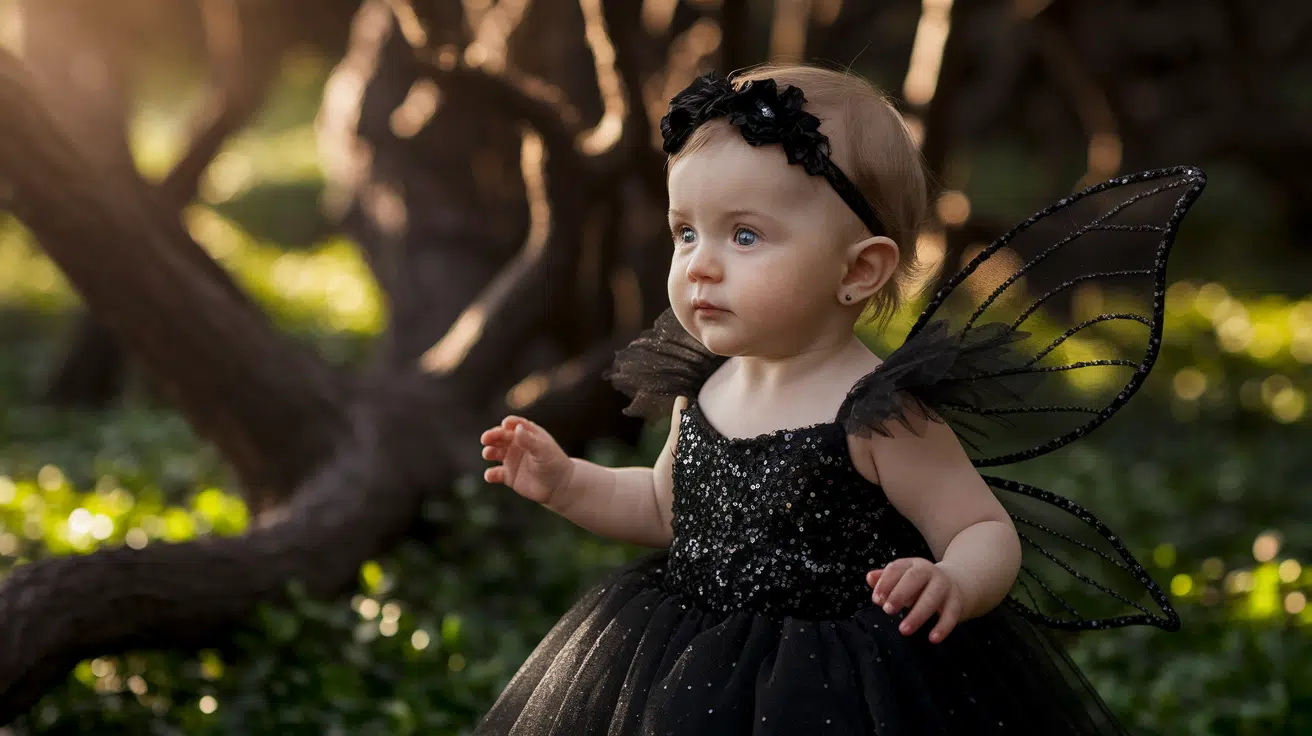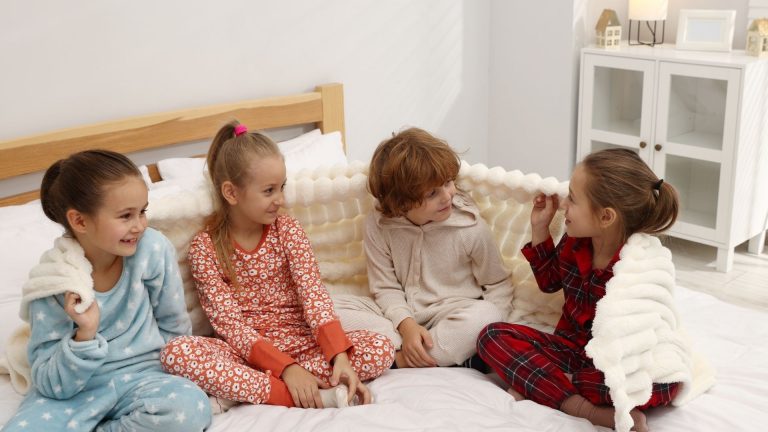111 Enchanting Names that Mean Fairy for Your Little Girl

Have you ever wished to add a touch of magic to your little one’s life? Naming a child after fairies might be the perfect way to start.
Fairies have danced through stories for centuries. These tiny, magical beings bring wonder and enchantment wherever they go.
Just like these mystical creatures, fairy-inspired names carry a special sparkle that stands out.
From Celtic legends to Asian myths, fairy tales exist in every corner of the world. Each culture offers beautiful names that capture this magical essence.
Some are bold and obvious, while others hide their fairy meaning behind lovely sounds.
This collection brings together magical names that mean fairy or have fairy-like qualities.
If you are expecting a baby or love fairy lore, these names will transport you to an enchanted world where anything seems possible.
Direct Fairy Names (Names that contain “fae/fairy”)

-
Fae
- Pronunciation: /feɪ/
- Origin and meaning: English, directly means “fairy”
-
Faeryn
- Pronunciation: /ˈfeɪrɪn/
- Origin and meaning: Modern English, “fairy ruler” or “of fairy descent”
-
Fayette
- Pronunciation: /feɪˈɛt/
- Origin and meaning: French, “little fairy”
-
Fairy
- Pronunciation: /ˈfɛəri/
- Origin and meaning: English, directly means “fairy being”
-
Faelynn
- Pronunciation: /ˈfeɪlɪn/
- Origin and meaning: Modern English, “fairy lake” or “fairy waterfall”
-
Fayola
- Pronunciation: /feɪˈoʊlə/
- Origin and meaning: Nigerian/Yoruba, “walks with honor” but adopted as fairy-associated
-
Faline
- Pronunciation: /fəˈliːn/
- Origin and meaning: French, “fairy queen”
-
Faylinn
- Pronunciation: /ˈfeɪlɪn/
- Origin and meaning: Modern English, “fairy pool” or “fairy waterfall”
-
Fey
- Pronunciation: /feɪ/
- Origin and meaning: English, “fated” or “otherworldly,” directly associated with fairies
-
Faelan
- Pronunciation: /ˈfeɪlən/
- Origin and meaning: Irish, “little wolf” but adapted as “little fairy”
-
Faera
- Pronunciation: /ˈfeɪərə/
- Origin and meaning: Modern, “fairy being”
-
Faelina
- Pronunciation: /feɪˈliːnə/
- Origin and meaning: Modern, “fairy-like.”
-
Fabia
- Pronunciation: /ˈfeɪbiə/
- Origin and meaning: Latin, adapted to mean “bean fairy” in folklore
-
Deira
- Pronunciation: /ˈdɪərə/
- Origin and meaning: Irish, “dark fairy”
-
Elani
- Pronunciation: /ɛˈlɑːni/
- Origin and meaning: Hawaiian, “tree fairy”
-
Pixie
- Pronunciation: /ˈpɪksi/
- Origin and meaning: English, “fairy, sprite”
-
Elfie
- Pronunciation: /ˈɛlfi/
- Origin and meaning: Germanic, “elf-like” or “fairy-like”
-
Sidhe
- Pronunciation: /ʃiː/
- Origin and meaning: Irish, “fairy mound” or “fairy people”
-
Peri
- Pronunciation: /ˈpɛri/
- Origin and meaning: Persian, “fairy-like being”
-
Sylph
- Pronunciation: /sɪlf/
- Origin and meaning: Greek, “fairy of the air”
-
Tinker
- Pronunciation: /ˈtɪŋkər/
- Origin and meaning: English, reference to Tinkerbell, the famous fairy
-
Tink
- Pronunciation: /tɪŋk/
- Origin and meaning: English, shortened form of Tinkerbell the fairy
Fairy Royalty & Mythological Fairy Beings

-
Titania
- Pronunciation: /tɪˈtɑːniə/
- Origin and meaning: Shakespearean, “queen of the fairies” in A Midsummer Night’s Dream
-
Aine
- Pronunciation: /ˈɑːnjə/ or /ˈɔːnjə/
- Origin and meaning: Irish, “radiance” or “fairy queen”
-
Maeve
- Pronunciation: /meɪv/
- Origin and meaning: Irish, “intoxicating” and associated with the fairy queen of Connacht
-
Ilona
- Pronunciation: /ɪˈloʊnə/
- Origin and meaning: Hungarian, “fairy queen” or “light”
-
Mab
- Pronunciation: /mæb/
- Origin and meaning: Celtic, “fairy queen” in Celtic and Shakespearean literature
-
Galadriel
- Pronunciation: /ɡəˈlædriɛl/
- Origin and meaning: Tolkien creation, “maiden crowned with a radiant garland,” an elf queen with fairy-like qualities
-
Nimue
- Pronunciation: /ˈnɪmweɪ/
- Origin and meaning: Arthurian legend, “lady of the lake” with fairy attributes
-
Cliodna
- Pronunciation: /kliːˈoʊnə/
- Origin and meaning: Irish, fairy queen associated with the otherworld
-
Morgan
- Pronunciation: /ˈmɔːrɡən/
- Origin and meaning: Welsh, “sea-born” and associated with fairy enchantress Morgan le Fay
-
Una
- Pronunciation: /ˈuːnə/
- Origin and meaning: Latin, “one” but in folklore associated with fairy queens
-
Niamh
- Pronunciation: /niːv/
- Origin and meaning: Irish, “bright” or “radiant,” daughter of the sea god and fairy woman
-
Melusine
- Pronunciation: /ˌmɛləˈziːn/
- Origin and meaning: French, fairy woman who transforms into a serpent
-
Viviane
- Pronunciation: /ˌvɪviˈæn/
- Origin and meaning: Arthurian legend, “lady of the lake” with fairy attributes
-
Tatiana
- Pronunciation: /tætiˈɑːnə/
- Origin and meaning: Russian form of Titania, fairy queen
-
Leanan
- Pronunciation: /ˈlɛnən/
- Origin and meaning: Irish, fairy muse who inspires creativity
-
Tam
- Pronunciation: /tæm/
- Origin and meaning: Scottish, shortened form of Tamlin, human stolen by fairy queen
-
Oona
- Pronunciation: /ˈuːnə/
- Origin and meaning: Irish, “one” but associated with fairy queens
-
Avery
- Pronunciation: /ˈeɪvəri/
- Origin and meaning: English, “ruler of the elves”
-
Luthien
- Pronunciation: /ˈluːθiən/
- Origin and meaning: Tolkien creation, elf maiden with fairy-like qualities
-
Etain
- Pronunciation: /ˈeɪdɑːn/
- Origin and meaning: Irish, fairy woman who transformed into a butterfly
-
Glinda
- Pronunciation: /ˈɡlɪndə/
- Origin and meaning: Literary creation, good witch/fairy from Oz
-
Sabrina
- Pronunciation: /səˈbriːnə/
- Origin and meaning: Celtic, river goddess with fairy qualities
Nature & Elemental Fairy Names
 content/uploads/2025/04/Nature__Elemental_Fairy_Names.ext”/>
content/uploads/2025/04/Nature__Elemental_Fairy_Names.ext”/>
-
Willow
- Pronunciation: /ˈwɪloʊ/
- Origin and meaning: English, tree traditionally associated with fairy habitats
-
Aurora
- Pronunciation: /əˈrɔːrə/
- Origin and meaning: Latin, “dawn,” associated with fairy light
-
Fauna
- Pronunciation: /ˈfɔːnə/
- Origin and meaning: Latin, nature spirit similar to fairies
-
Flora
- Pronunciation: /ˈflɔːrə/
- Origin and meaning: Latin, flower fairy or nature spirit
-
Aiken
- Pronunciation: /ˈeɪkən/
- Origin and meaning: Scottish, “little oak,” trees associated with fairy rings
-
Marigold
- Pronunciation: /ˈmærɪˌɡoʊld/
- Origin and meaning: English, flower said to be beloved by fairies
-
Mariposa
- Pronunciation: /ˌmærɪˈpoʊsə/
- Origin and meaning: Spanish, “butterfly,” creatures associated with fairies
-
Ayla
- Pronunciation: /ˈeɪlə/
- Origin and meaning: Turkish, “moonlight,” associated with moon fairies
-
Bluebell
- Pronunciation: /ˈbluːˌbɛl/
- Origin and meaning: English, flower associated with fairy habitats
-
Elowen
- Pronunciation: /ɛˈloʊən/
- Origin and meaning: Cornish, “elm tree,” associated with tree fairies
-
Fawn
- Pronunciation: /fɔːn/
- Origin and meaning: English, young deer, creatures associated with fairy companions
-
Fern
- Pronunciation: /fɜːrn/
- Origin and meaning: English, plant whose seeds were thought to make one invisible like fairies
-
Lavender
- Pronunciation: /ˈlævəndər/
- Origin and meaning: English, plant loved by fairies
-
Luna
- Pronunciation: /ˈluːnə/
- Origin and meaning: Latin, “moon,” associated with moon fairies
-
Nerida
- Pronunciation: /nəˈriːdə/
- Origin and meaning: Greek, “sea nymph” or water fairy
-
Primrose
- Pronunciation: /ˈprɪmroʊz/
- Origin and meaning: English, flower associated with fairy paths
-
Skye
- Pronunciation: /skaɪ/
- Origin and meaning: Scottish, “sky,” domain of air fairies
-
Tansy
- Pronunciation: /ˈtænzi/
- Origin and meaning: English, flower used in fairy medicine
-
Thyme
- Pronunciation: /taɪm/
- Origin and meaning: English, herb attracting fairies to gardens
-
Wisteria
- Pronunciation: /wɪˈstɪəriə/
- Origin and meaning: English, flowering vine associated with fairy dwellings
-
Yara
- Pronunciation: /ˈjɑːrə/
- Origin and meaning: Brazilian, “water lady” or water fairy
-
Zephyr
- Pronunciation: /ˈzɛfər/
- Origin and meaning: Greek, “west wind,” domain of air fairies
-
Zinnia
- Pronunciation: /ˈzɪniə/
- Origin and meaning: German, flower said to be planted by fairies
-
Peony
- Pronunciation: /ˈpiːəni/
- Origin and meaning: Greek, flower protected by fairies
-
Briar
- Pronunciation: /ˈbraɪər/
- Origin and meaning: English, thorny plant protecting fairy dwellings
-
Clover
- Pronunciation: /ˈkloʊvər/
- Origin and meaning: English, plant associated with fairy luck
-
Daffodil
- Pronunciation: /ˈdæfəˌdɪl/
- Origin and meaning: English, flower that heralds fairy spring
-
Meadow
- Pronunciation: /ˈmɛdoʊ/
- Origin and meaning: English, open field where fairies dance
-
Yarrow
- Pronunciation: /ˈjæroʊ/
- Origin and meaning: English, plant used in fairy divination
-
Lily
- Pronunciation: /ˈlɪli/
- Origin and meaning: English, flower associated with fairies and fairy habitats
-
Roisin
- Pronunciation: /roʊˈʃiːn/
- Origin and meaning: Irish, “little rose,” often linked to fairy folk in Irish tales
-
Ondine
- Pronunciation: /ɒnˈdiːn/
- Origin and meaning: Latin, “little wave,” a water fairy or nymph
-
Nyx
- Pronunciation: /nɪks/
- Origin and meaning: Greek, goddess of night, associated with night fairies
-
Iridessa
- Pronunciation: /ˌɪrɪˈdɛsə/
- Origin and meaning: Modern creation, light fairy from Peter Pan stories
-
Silvermist
- Pronunciation: /ˈsɪlvərˌmɪst/
- Origin and meaning: Modern creation, water fairy from Peter Pan stories
Elfin & Otherworldly Fairy Names

-
Siobhan
- Pronunciation: /ʃəˈvɔːn/
- Origin and meaning: Irish, associated with fairy goddess
-
Tara
- Pronunciation: /ˈtɑːrə/
- Origin and meaning: Celtic, “fairy hill” or “where fairies dwell”
-
Avalon
- Pronunciation: /ˈævəˌlɒn/
- Origin and meaning: Celtic, “island of apples” where fairies dwell
-
Alva
- Pronunciation: /ˈælvə/
- Origin and meaning: Scandinavian, “elf” or “fairy being”
-
Gwenhwyfar
- Pronunciation: /ˌɡwɛnˈhwɪvər/
- Origin and meaning: Welsh, “white fairy” or “white phantom”
-
Elva
- Pronunciation: /ˈɛlvə/
- Origin and meaning: Irish, “elf” or “fairy wisdom”
-
Ellette
- Pronunciation: /ɛˈlɛt/
- Origin and meaning: French, “little elf” or “little fairy”
-
Elvina
- Pronunciation: /ɛlˈviːnə/
- Origin and meaning: Germanic, “elf friend” or “fairy friend”
-
Alfreda
- Pronunciation: /ælˈfriːdə/
- Origin and meaning: Germanic, “elf counsel” or “fairy wisdom”
-
Elfriede
- Pronunciation: /ˈɛlfriːdə/
- Origin and meaning: Germanic, “elf strength” or “fairy power”
-
Aisling
- Pronunciation: /ˈæʃlɪŋ/
- Origin and meaning: Irish, “dream” or “vision,” associated with fairy visions
-
Caoilainn
- Pronunciation: /ˈkiːlɪn/
- Origin and meaning: Irish, “slender and fair,” associated with fairy lineage
-
Alvina
- Pronunciation: /ælˈvaɪnə/
- Origin and meaning: Germanic, “elf friend”
-
Ariel
- Pronunciation: /ˈɛəriəl/
- Origin and meaning: Hebrew, “lion of God” but known as an air spirit or fairy in literary works
-
Robin
- Pronunciation: /ˈrɒbɪn/
- Origin and meaning: English, bird associated with Puck, a fairy or sprite
-
Merryweather
- Pronunciation: /ˈmɛriˌwɛðər/
- Origin and meaning: English, fairy from Sleeping Beauty
-
Vidia
- Pronunciation: /ˈvɪdiə/
- Origin and meaning: Modern creation, fast-flying fairy
Enchanted & Magical Fairy Names

-
Fiorella
- Pronunciation: /fiˈɔːrɛlə/
- Origin and meaning: Italian, “little flower fairy”
-
Layla
- Pronunciation: /ˈleɪlə/
- Origin and meaning: Arabic, “night” or “dark beauty,” associated with night fairies
-
Isadora
- Pronunciation: /ˌɪzəˈdɔːrə/
- Origin and meaning: Greek, “gift of Isis,” associated with fairy gifts
-
Calista
- Pronunciation: /kəˈlɪstə/
- Origin and meaning: Greek, “most beautiful,” quality attributed to fairies
-
Cosette
- Pronunciation: /koʊˈzɛt/
- Origin and meaning: French, “little thing,” used for tiny fairy beings
-
Fairuza
- Pronunciation: /feɪˈruːzə/
- Origin and meaning: Persian, “turquoise,” color associated with fairy magic
-
Malwina
- Pronunciation: /mælˈwiːnə/
- Origin and meaning: Germanic, “friend of justice,” associated with fairy justice
-
Orla
- Pronunciation: /ˈɔːrlə/
- Origin and meaning: Irish, “golden princess,” attribute of fairy royalty
-
Rosalind
- Pronunciation: /ˈrɒzəlɪnd/
- Origin and meaning: Germanic, “gentle horse,” associated with fairy steeds
-
Seren
- Pronunciation: /ˈsɛrən/
- Origin and meaning: Welsh, “star,” associated with star fairies
-
Evanthe
- Pronunciation: /ɛˈvænθi/
- Origin and meaning: Greek, “fair flower,” fairy attribute
-
Gwyneira
- Pronunciation: /ɡwɪˈneɪrə/
- Origin and meaning: Welsh, “white snow,” associated with winter fairies
-
Jessamine
- Pronunciation: /ˈdʒɛsəmɪn/
- Origin and meaning: Persian, “jasmine flower,” attracts fairies
-
Rosalie
- Pronunciation: /ˈroʊzəli/
- Origin and meaning: French, “rose,” flowers associated with fairy gardens
-
Rosetta
- Pronunciation: /roʊˈzɛtə/
- Origin and meaning: Italian, “little rose,” name of a popular garden fairy
How to Choose the Perfect Fairy Name for Your Child
Selecting a fairy-inspired name for your little one is a magical decision, but it does come with some practical considerations.
Here’s how to find that perfect balance between enchantment and everyday life.
Think about the meaning behind the name. Some fairy names directly mean “fairy” (like Fae or Pixie), while others have subtle connections to fairy lore (like Lily or Willow).
Consider the name’s origin story. Many fairy names come from rich cultural traditions. Names like Aine (Irish), Ilona (Hungarian), or Yara (Brazilian) carry beautiful folklore along with them.
Think about your child’s future. While we all want our children to embrace magic and wonder, remember that they’ll grow into adults who may work in professional settings.
Wrapping it up!
Choosing a fairy-inspired name is like sprinkling a bit of magic dust on your child’s life.
These names offer something for every family – from bold and whimsical choices to subtle nods to the fairy realm.
The perfect fairy name balances wonder with practicality. It should feel right not just in bedtime stories but also in school hallways and future workplaces.
You choose Titania or Luna, Oberon or Fae, and your choice honors ancient traditions of wonder and possibility.
These names connect us to stories told around fires for thousands of years, to the magic that has always lived at the edges of our world.
The right fairy name isn’t just beautiful – it’s a wish and a blessing, a whisper of enchantment that will follow your child throughout their life.
Which magical name will you choose?






